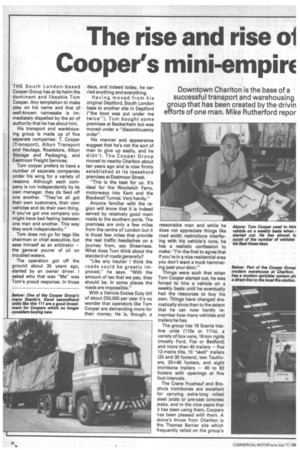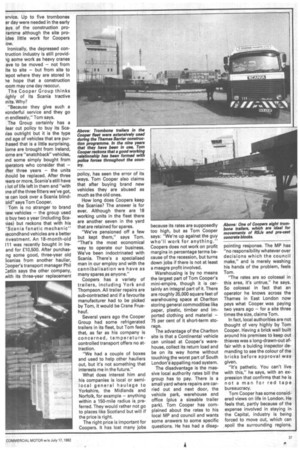The rise and rise ol Cooper's mini-empin
Page 28

Page 29

If you've noticed an error in this article please click here to report it so we can fix it.
Downtown Charlton is the base of a successful transport and warehousing group that has been created by the drivin efforts of one man. Mike Rutherford repor
THE South London-based Cooper Group has at its helm the dominant and likeable Torn Cooper. Any temptation to make play on his name and that of well-known namesake is immediately dispelled by the air of authority that he has about him.
His transport and warehousing group is made up of five separate companies: T. Cooper (Transport), Albyn Transport and Haulage, Roadstore, Albyn Storage and Packaging, and Eastmoor Freight Services.
Tom cooper prefers to have a number of separate companies under his wing for a variety of reasons. Although each company is run independently by its own manager, they do feed off one another. "They've all got their own customers, their own vehicles and do their own thing. If you've got one company you might have bad feeling between one man and another. This way they work independently."
Tom does not go for tags like chairman or chief executive, but sees himself as an arbitrator — the general pourer of oil on troubled waters.
The operation got off the ground about 35 years ago, started by an owner driver. asked who that was "Me" was Tom's proud response. In those days, and indeed today, he carried anything and everything.
Having moved from his original Deptford, South London base to another site in Deptford ("the boot was put under me twice"), Tom bought some premises at Beckenham but was moved under a "discontinuency order".
His manner and appearance suggest that he's not the sort of man to give up easily, and he didn't. The Cooper Group moved to nearby Charlton about ten years ago and is now firmly established at its leasehold premises at Eastmoor Street.
"This is the best for us. It's ideal for the Woolwich Ferry, motorways into Kent and the Blackwell Tunnel. Very handy."
Anyone familiar with the region will know that it is indeed served by relatively good main roads to the southern ports. The premises are only a few miles from the centre of London but it is those few miles that provide the real traffic headaches on a journey from, say Sheerness. What does Tom think about the standard of roads generally?
"Like any haulier I think the roads could be greatly improved," he says. "With the amount of tax that we pay, they should be. In some places the roads are impossible."
With a Vehicle Excise Duty bill of about £50,000 per year it's no wonder that operators like Tom Cooper are demanding more for their money. He is, though, a
reasonable man and while he does not appreciate things like road width restrictions interfering with his vehicle's runs, he has a realistic confession to make: "I'm the first to agree that if you're in a nice residential area you don't want a truck hammering past your door."
Things were such that when Tom Cooper started out, he was forced to hire a vehicle on a weekly basis until he eventually had the resources to buy his own. Things have changed dramatically since then to the extent that he can now hardly remember how many vehicles and trailers he has.
The group has 18 Scania tractive units (110s or 111s), a variety of box vans, 16-ton rigids (mostly Ford, Fiat or Bedford) and more than 40 trailers — five 12-metre tilts, 10 "skelt" trailers (20 and 30 footers), two Tautliners, 20x40 footers, and eight trombone trailers — 40 to 63 footers with openings at five foot intervals.
The Crane Fruehauf and Broshuis trombones are excellent for carrying extra-long rolled steel joists or pre-cast concrete slabs, and in the nine years that it has been using them, Coopers has been pleased with them. A stone's throw from Charlton is the Thames Barrier site which frequently relied on the group's ervice. Up to five trombones er day were needed in the early ays of the construction proramme although the site proides little work for Coopers ow.
Ironically, the depressed contruction industry is still providig some work as heavy cranes ave to be moved — not from ite to site — but from site to epot where they are stored in he hope that a construction ■ oom may one day reoccur.
The Cooper Group thinks lighly of its Scania tractive iflits. Why?
"Because they give such a uonderful service and they go in endlessly," Tom says.
The Group certainly has a lear cut policy to buy its Sealias outright but it is the type ind age of vehicles that are purbased that is a little surprising. ;ome are brought from Ireland, ,ome are "snatchback" vehicles, ind some simply bought from )perators who consider that — ifter three years — the units ;hould be replaced. After three 'ears or more, Scania's still have lot of life left in them and "with me of the three fitters we've got, le can look over a Scania blindold" says Tom Cooper.
Toni is no stranger to brand iew vehicles — the group used o buy two a year (including Scalies) but reckons that with his 'Scania fanatic mechanic" ;econdhand vehicles are a better nvestment. An 18-month-old 111 was recently bought in Ireand for £10,500. After purchasng some good, three-year old 3canias from another haulier, 2ooper's transport manager Phil 1:atlin says the other company, Nith its three-year replacement policy, has seen the error of its ways. Tom Cooper also claims that after buying brand new vehicles they are abused as much as the old ones.
How long does Coopers keep the Scanias? The answer is for ever. Although there are 18 working units in the fleet there are another seven in the yard that are retained for spares.
"We've pensioned off a few but kept them," says Tom. "That's the most economical way to operate our business. We've been indoctrinated with Scania. There's a specialised man in our employ and with the cannibalisation we have as many spares as anyone."
Coopers has a variety of trailers, including York and Thompson. All trailer repairs are sub-contracted and if a favourite manufacturer had to be picked by Tom, it would be Crane Fruehauf.
Several years ago the Cooper Group had some refrigerated trailers in its fleet, but Tom feels that, as far as his company is concerned, temperaturecontrolled transport offers no attraction.
"We had a couple of boxes and used to help other hauliers out, but it's not something that interests me in the future."
What does interest him and his companies is local or semilocal general haulage to Yorkshire, the Midlands and Norfolk, for example — anything within a 150-mile radius is preferred. They would rather not go to places like Scotland but will if the price is right.
The right price is important for Coopers. It has lost many jobs because its rates are supposedly too high, but as Tom Cooper says: "We're up against the guy who'll work for anything." Coopers does not work on profit margins in percentage terms because of the recession, but turns down jobs if there is not at least a meagre profit involved.
Warehousing is by no means the largest part of Tom Cooper's mini-empire, though it is certainly an integral part of it. There are roughly 35,000 square feet of warehousing space at Charlton storing general commodities like paper, plastic, timber and imported clothing and material — 75 per cent of it short-term storage.
The advantage of the Charlton site is that a Continental vehicle can unload at Cooper's warehouse, collect its return load and be on its way home without touching the worst part of South London's appalling road system.
The disadvantage is the massive local authority rates bill the group has to pay. There is a small yard where repairs are carried out and next door, the vehicle park, warehouse and office (plus a sizeable trailer park). Tom Cooper has complained about the rates to his local MP and council and wants some answers to some specific questions. He has had a disap pointing response. The MP has "no responsibility whatever over decisions which the council make," and is merely washing his hands of the problem, feels Tom.
"The rates are so colossal in this area, it's untrue," he says. So colossal in fact that an operator he knows across the Thames in East London now pays what Cooper was paying two years ago — for a site three times the size, claims Tom.
In fact, local authorities are not thought of very highly by Tom Cooper. Having a brick wall built around his premises to keep out thieves was a long-drawn-out affair with a buiding inspector demanding to see the colour of the bricks before approval was given.
"It's pathetic. You can't live with this," he says, with an expression that confirms that he is not a man for red tape bureaucracy.
Tom Cooper has some considered views on life in London. He feels that, partly because of the expense involved in staying in the Capital, industry is being forced to move out, which can spoil the surrounding regions.
















































